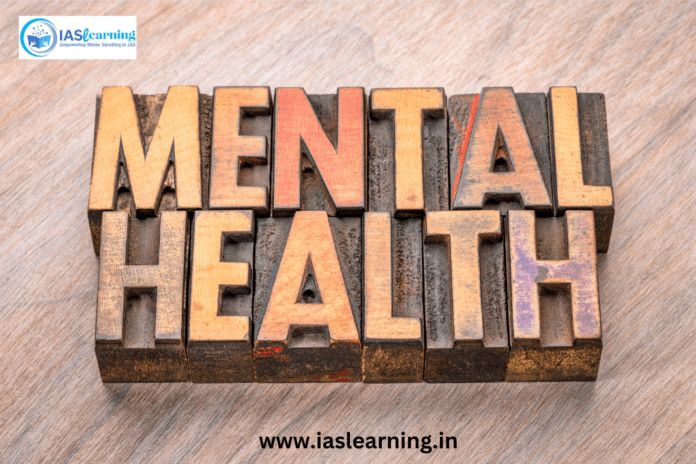Table of Contents
Introduction
Mental health issues have emerged as one of the foremost contributors to the global health burden, and the situation in India is particularly concerning. Despite efforts to address this critical issue, there has been no significant reduction in the prevalence of mental disorders in India since 1990. Suicidal rates in the country are alarmingly high, especially when compared to nations at a similar socio-economic level.
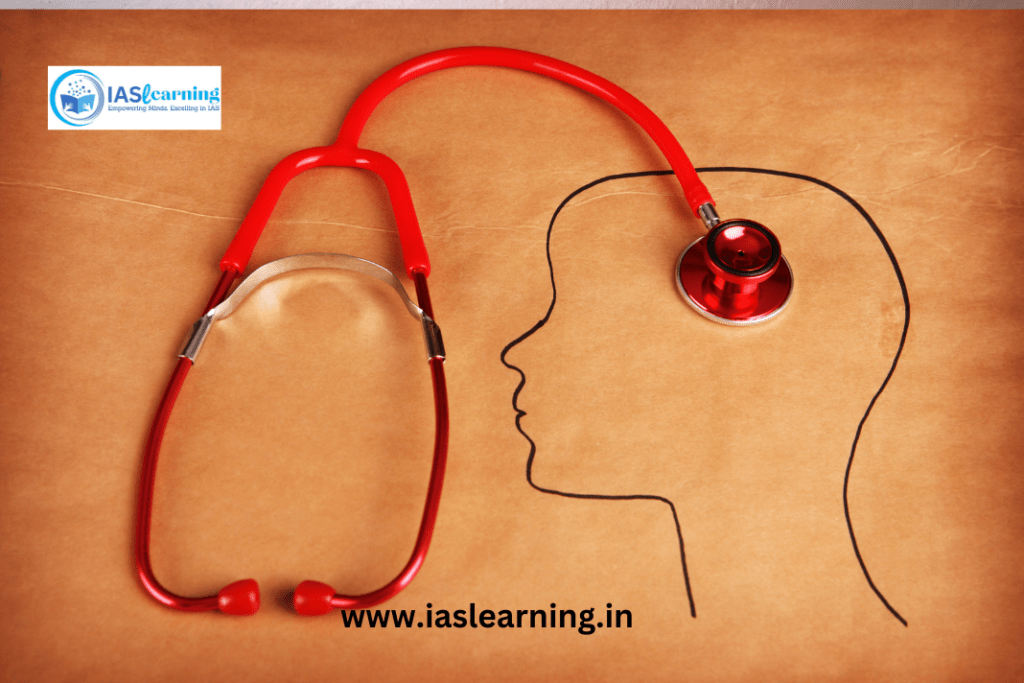
According to the latest survey by India’s National Institute of Mental Health and Neurosciences (NIMHANS), a staggering 150 million Indians require mental healthcare services, yet less than 30 million are actively seeking help. This situation highlights numerous challenges within the mental healthcare system in India, including issues related to access and societal attitudes towards mental health. While the government has initiated various programs to enhance access to mental healthcare services and promote a more inclusive discourse on mental health, the data underscores the need for further concerted efforts in this domain.
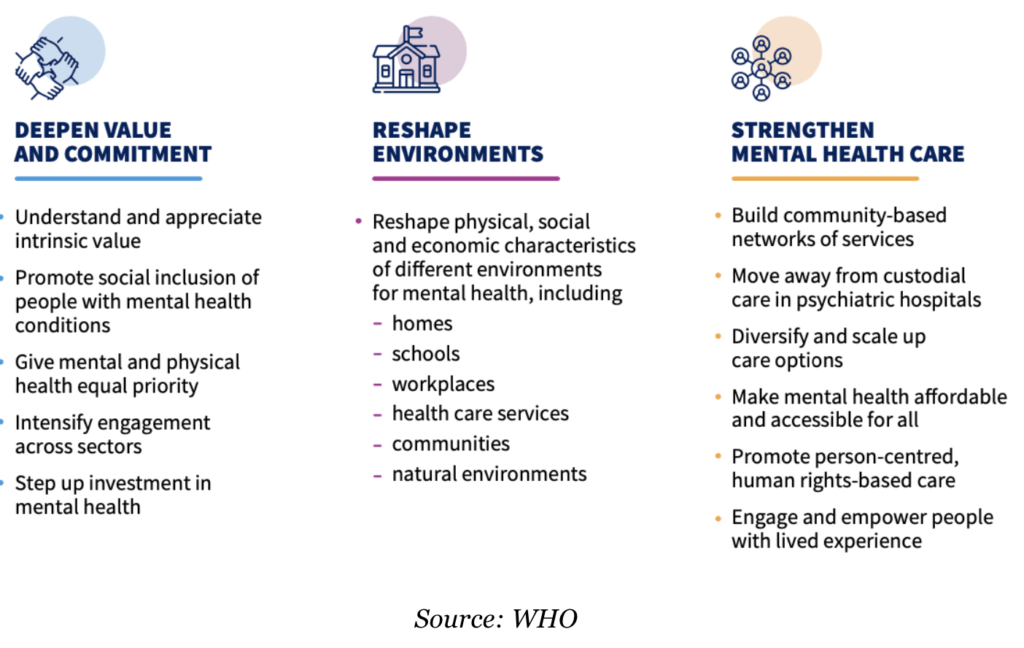
Status of Mental Health in India
The World Health Organization (WHO) defines mental health as a state of well-being that enables individuals to effectively cope with life’s stresses, realize their potential, learn, work, and contribute to their communities. It is a fundamental aspect of health and well-being that underpins personal and collective decision-making, relationship-building, and the shaping of our society.
Mental health is considered a basic human right by the WHO, and it plays a pivotal role in personal, community, and socio-economic development.
According to WHO data, mental illnesses account for approximately 15% of all global disease conditions. In 2019, India’s suicide rate stood at 12.9 per 100,000 individuals, surpassing the regional average of 10.2 and the global average of 9.0. Tragically, suicide has become the leading cause of death among individuals aged 15 to 29 in India.
In 2017, a comprehensive estimation of the burden of mental health conditions across Indian states revealed that approximately 197.3 million people, or roughly 14% of the population, required care for mental health conditions. This included around 45.7 million individuals with depressive disorders and 44.9 million with anxiety disorders.
The National Mental Health Survey conducted by NIMHANS in 12 Indian states indicated a high prevalence of mental health issues in urban metropolitan areas. Approximately 1 in 20 individuals suffer from depression, and 0.9% of the surveyed population were identified as being at high risk of suicide.
According to data from the National Crime Records Bureau (NCRB), 164,033 people took their own lives in 2021, marking a 6.2% increase compared to 2020.
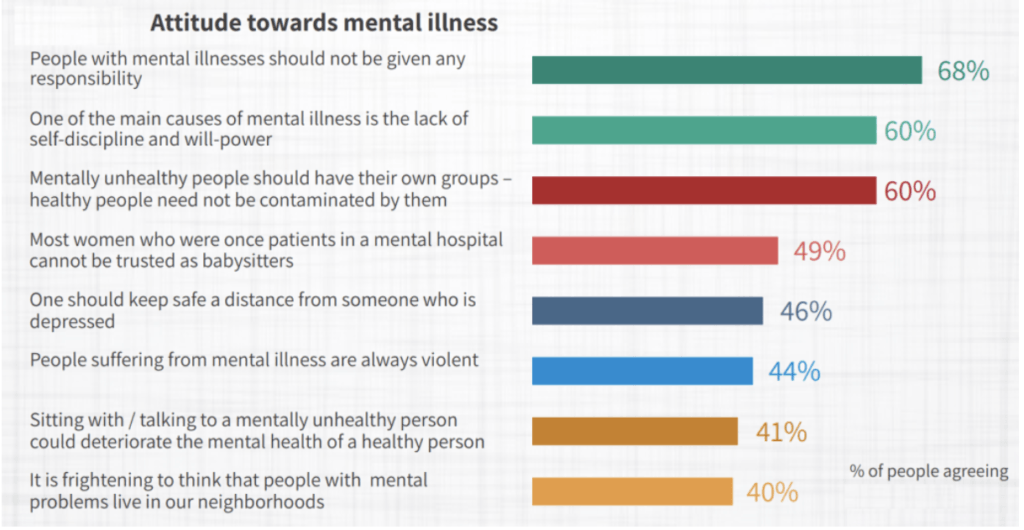
Harmful Effects of Poor Mental Health
- Impact on Physical Health: Research has shown a clear connection between mental and physical health. Positive psychological well-being can reduce the risk of heart attacks and strokes. Conversely, poor mental health can lead to harmful behaviors and have detrimental effects on physical well-being. Conditions like depression have been linked to various chronic illnesses, including diabetes, asthma, cancer, cardiovascular disease, and arthritis. The stress and inflammation associated with poor mental health can exacerbate these physical health issues, leading to a vicious cycle of decline.
- Impact on Relationships: Mental health conditions, particularly during adolescence and young adulthood, can significantly affect one’s ability to form and maintain healthy relationships. These conditions can strain relationships with peers, parents, teachers, colleagues, and partners. The stigma and challenges associated with mental health issues may lead to misunderstandings, isolation, and strained interactions, further impacting a person’s social connections and support system.
- Impact on Productivity: Poor mental health can hamper a person’s ability to concentrate, stay motivated, and engage in productive activities. This can lead to decreased work performance, absenteeism, and difficulties in meeting personal and professional responsibilities. Individuals with mental health issues may find it challenging to focus, make decisions, and effectively manage their daily tasks, which can have a negative impact on their overall productivity and quality of life.
- Cyclical Relationship with Vulnerability: The World Health Organization’s Report on Mental Health and Development in 2010 highlighted the existence of a cyclical relationship between vulnerability and poor mental health. People with mental health conditions are often vulnerable to stigma, discrimination, violence, marginalization, and violations of their human rights. This vulnerability can worsen their mental health, creating a feedback loop of increased vulnerability and worsening mental well-being. Breaking this cycle requires addressing both the mental health issues and the social determinants that contribute to vulnerability and discrimination.
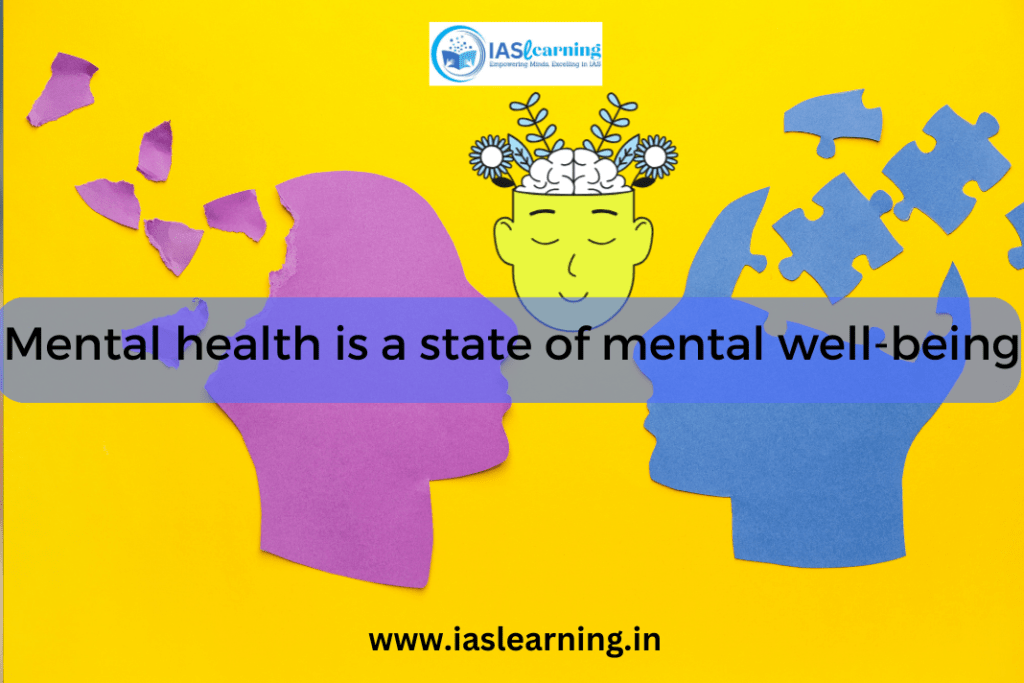
Reasons for the Poor Status of Mental Health in India
- Lack of Awareness and Sensitivity: Mental health issues in India often face a lack of awareness and sensitivity. These problems are frequently not regarded as healthcare issues, and individuals experiencing mental health challenges are often stigmatized. The societal perception that those with mental health issues are weak or “lunatics” contributes to shame, suffering, and isolation. Stigma and discrimination can erode social support structures and hinder individuals from seeking help. A 2018 survey revealed that while many respondents had some awareness of mental illness, a significant portion still used stigmatizing terms.
- Shortage of Mental Healthcare Personnel: India faces a severe shortage of mental healthcare professionals. According to the World Health Organization (WHO), in 2011, the country had only 0.301 psychiatrists and 0.047 psychologists for every 100,000 individuals with mental health disorders. In contrast, developed countries typically have ratios exceeding 10 mental health professionals per 100,000 patients. This shortage hampers access to mental healthcare services, making it difficult for those in need to receive timely and adequate treatment.
- Treatment Gap: Currently, only a small percentage, estimated at 20-30%, of individuals with mental illnesses in India receive adequate treatment. One significant reason for this wide treatment gap is the scarcity of resources, both in terms of mental healthcare professionals and facilities. Many individuals who require treatment do not have access to it due to these limitations.
- Low Budget Allocation: India allocates a minimal budget to mental healthcare compared to developed countries. While developed nations allocate between 5-18% of their annual healthcare budget to mental health, India allocates approximately 0.05% of its healthcare budget. This is the lowest among all G20 countries. Despite the growing prevalence of mental health issues, the Union Ministry of Health allocated less than 1% of its budget specifically to address psychological illnesses in 2022. This inadequate funding limits the development of mental healthcare infrastructure and services.
- Changed Lifestyle: The changing lifestyle and increased use of certain types of social media have contributed to higher stress and mental health issues, particularly among young people. Social media can detract from face-to-face relationships, reduce engagement in meaningful activities, and erode self-esteem through unfavorable social comparisons. Additionally, the shift towards nuclear families has reduced traditional avenues of emotional support, as family members may not always be available to provide emotional assistance during times of need.
- Income Inequalities: Mental health issues are closely tied to poverty. Individuals living in poverty are at a greater risk of experiencing mental health conditions. Conversely, people with severe mental health issues are more likely to fall into poverty due to factors such as loss of employment and increased healthcare expenses. Income inequalities exacerbate these disparities, as access to mental healthcare services can be limited for those with limited financial resources.

Steps Taken to Improve Mental Health in India
Legal Measures
- The Mental Healthcare Act, 2017: This act replaced the outdated Mental Healthcare Act of 1987 and aimed to protect the rights and dignity of individuals with mental illness. It guarantees the right to access mental healthcare services and allows individuals to create advance directives for their treatment. Importantly, it decriminalized suicide, recognizing it as a mental health issue rather than a crime.
- Rights of Persons with Disabilities Act, 2017: This act acknowledges mental illness as a disability and seeks to enhance the rights and entitlements of disabled individuals, including those with mental health conditions, to ensure their empowerment and inclusion in society.
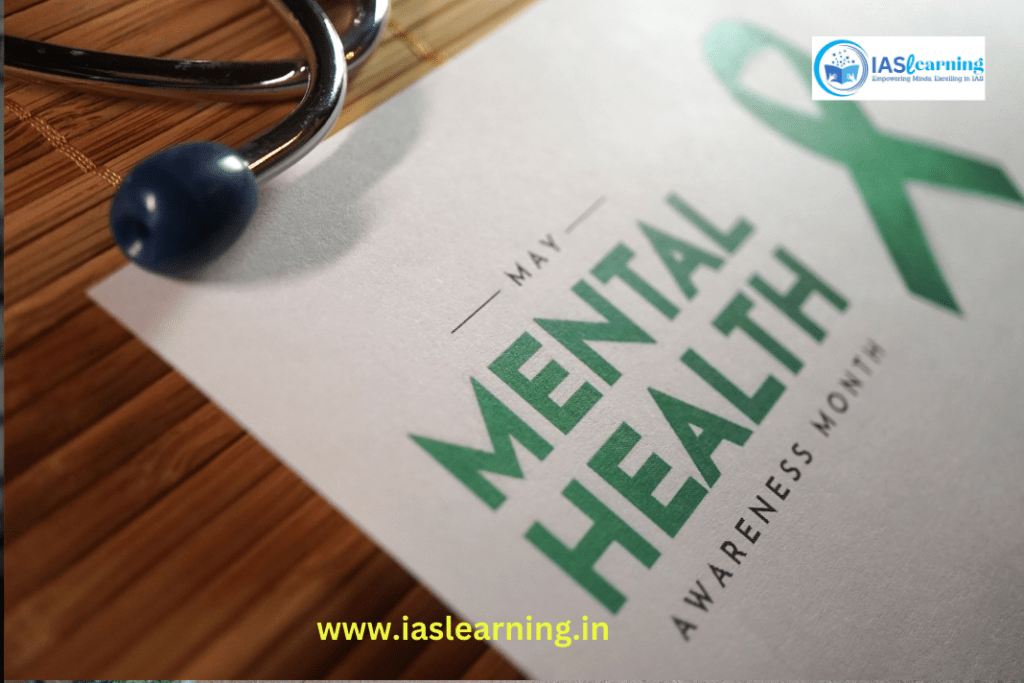
Schemes and Initiatives
- National Mental Health Programme (NMHP): NMHP, initiated in 1982, integrates mental health services into the general healthcare system. The District Mental Health Programme (DMHP) component has been implemented in over 700 districts. Services include outpatient care, assessment, counseling, psycho-social interventions, drug support, outreach programs, and in-patient facilities at the district level.
- Generating Awareness: Information, Education, and Communication (IEC) activities are a crucial part of NMHP. Districts receive funding for IEC and awareness campaigns in communities, schools, and workplaces. Activities like awareness messages in local media, street plays, and wall paintings are conducted to reduce stigma and raise awareness about mental health.
- National Tele Mental Health Programme: Announced in the 2022-23 budget, this program aims to improve access to quality mental health counseling and care services through telehealth.
- Kiran Helpline: Established by the Ministry of Social Justice and Empowerment in 2020, Kiran is a 24/7 toll-free helpline offering support for anxiety, stress, depression, suicidal thoughts, and other mental health issues.
- Manodarpan: Part of the Atmanirbhar Bharat Abhiyan, this initiative focuses on providing psychosocial support to students. It includes advisory guidelines, a national directory of counselors, a toll-free helpline, and educational materials.
- Guidelines/Advisories: The government has issued guidelines and advisories on the management of mental illness, which are accessible on the Union Ministry of Health and Family Welfare’s website.
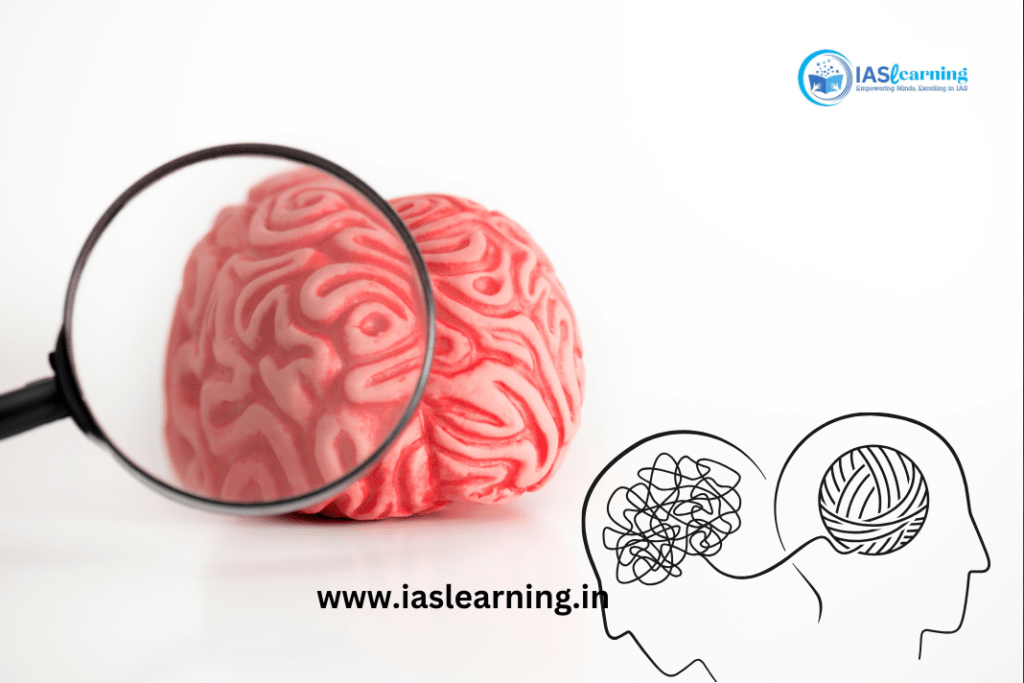
Steps to be Taken Further
- Addressing Stigma: Initiatives must focus on reducing the deep-seated stigma associated with mental health issues to encourage individuals to seek timely treatment without feeling shame, isolation, or weakness.
- Integration with Public Health Programs: Mental health should be integrated into public health programs to reduce stress, promote healthy lifestyles, identify high-risk groups, and strengthen interventions like counseling services, particularly in schools and for vulnerable populations.
- Infrastructure Improvement: Investment is needed to enhance mental health infrastructure and treatment facilities. Innovative models and trained community health workers can help expand access to services.
- Budget Allocation: There should be increased allocation in the budget for mental healthcare to bridge the treatment gap, improve infrastructure, and build a skilled workforce.
- Data and Research: Comprehensive research and data collection efforts are essential to understand the scale of the mental health problem and inform effective strategies.
- WHO’s Three Paths to Transformation: Implementing the WHO’s recommended paths, which include leadership and governance, comprehensive service provision, and a vibrant social movement, can drive improvements in mental health.
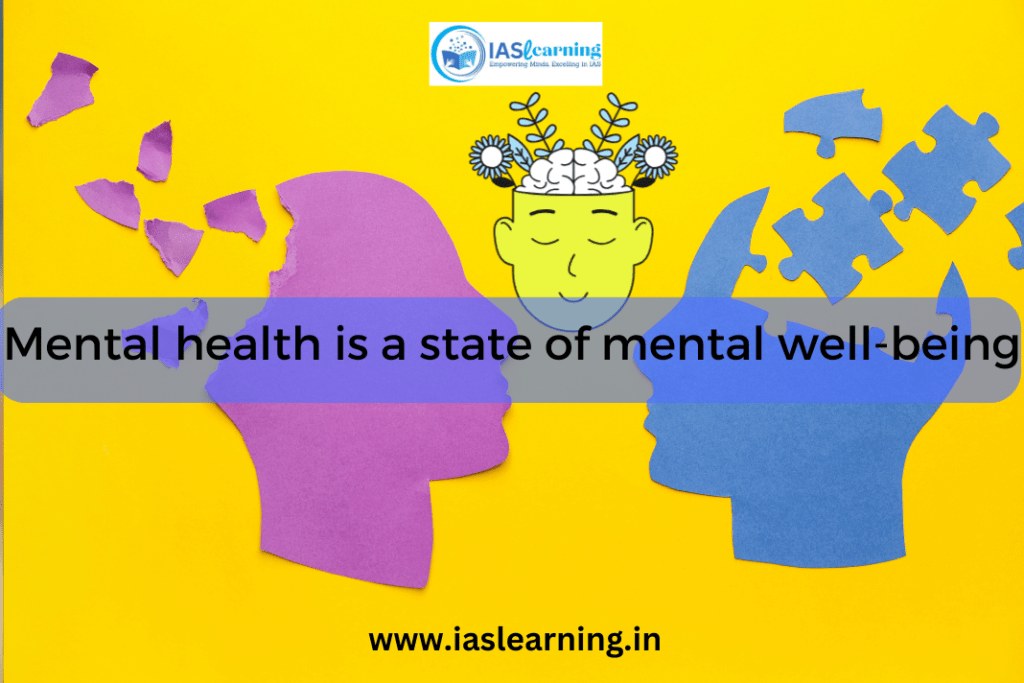
Conclusion
The status of mental health in India is at a critical juncture, with a pressing need for comprehensive reforms and investments to address the numerous challenges it faces. While significant steps have been taken to improve mental health in the country, including the enactment of the progressive Mental Healthcare Act, 2017, and the implementation of various initiatives and helplines, much remains to be done.
Stigma and discrimination surrounding mental health continue to hinder progress, preventing individuals from seeking timely and necessary treatment. To move forward, it is imperative to tackle these deeply rooted misconceptions and prejudices through robust awareness campaigns and education.
Integration of mental health into the public health framework, particularly in schools and for vulnerable populations, is essential to reduce stress and promote healthier lifestyles. The shortage of mental healthcare personnel and inadequate budget allocation must be addressed to bridge the treatment gap and improve the quality of care.
Furthermore, efforts to collect quality data and conduct research are critical to understanding the scope of the problem and tailoring interventions effectively.
To protect, promote, and care for the mental health of the people of India, a “whole-of-society” approach is required, based on the pillars of reducing stigma, integrating mental health into public health, improving infrastructure and funding, data-driven policies, and the WHO’s recommended paths to transformation.
Addressing mental health comprehensively is not only a matter of individual well-being but also contributes to the overall development and prosperity of the nation. It is a testament to a society’s compassion and progress when it ensures that every citizen has the opportunity to live a life of dignity, free from the burden of untreated mental illness.

